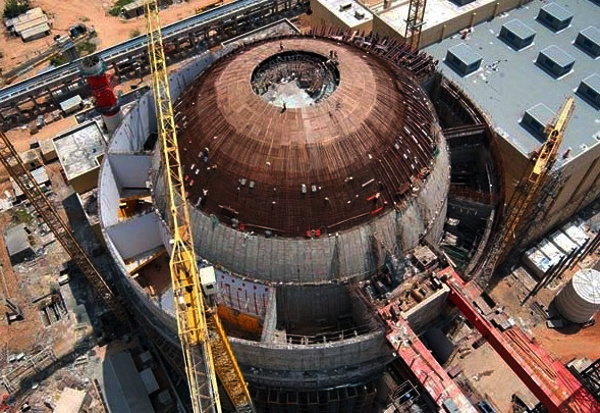NEW DELHI: Foreign-funded non-government organisations (NGOs) are trying to “sabotage” a nuclear power plant under construction in Gorakhpur village in Fatehabad district in Haryana, sources tell The Sunday Guardian. It’s because of the protests that the project, which will generate power once completed, is running late.
The deadline for the “partial” production of power from the atomic power plant was the end of this year, but the constant protests organised by allegedly vested interest groups have impacted the project in a way that power generation may start only by 2025.
Anti-nuclear activists have been asking questions pertaining to the availability of water at the Gorakhpur plant and security aspects in case an accident occurs. They say that the only source of water in the area is a canal and that using water from the canal will lead to low availability of water for farmers in the region.
However, experts and the Nuclear Power Corporation of India Limited (NPCIL), the implementing authority for nuclear plants in the country, have already said that such questions are baseless.
On the condition of anonymity, a senior NPCIL official told The Sunday Guardian: “With regard to the Haryana nuclear power project, a team from the NPCIL had answered all the questions that were raised by the NGOs. The questions related to displacement of residents from the area, employment and hot water disposal have already been addressed, but the NGOs are posing a new question every day and those certainly cannot be answered right away.”
“Also, digging a borehole of 200 metre depth for disposal of hot water, or construction of pond for waste management, is a decision taken by the scientists; the NPCIL ensures 100% security. These are totally the experts’ decisions, but the protesting NGOs are misguiding the people. The NGOs are also creating fear in the minds of common people by citing examples of nuclear accidents in Japan and Russia, which is clearly unfair,” the same official said.
“India witnessed similar attempts from vested interests to sabotage the Kudankulam Nuclear Power Plant (KKNP) in the past and now the same foreign-funded groups of NGOs are trying to halt the country’s nuclear power projects. While most developed countries are switching to nuclear-based power projects that help them reduce carbon emission, our country is still reliant on coal-based power projects,” the official added.
Presently, excavation work is in progress at the Haryana atomic power project. The project is of 700 MW capacity and will be built in two phases. The approved completion cost of the project in Gorakhpur is Rs 20,594 crore. The project is expected to generate employment for about 2,000 persons on becoming operational.
According to the Department of Atomic Energy (DAE), the country is working on 21 new nuclear power reactors with a total installed capacity of 15,700 MW. Most of these projects are expected to be completed by 2025.
Most of these projects are being set up in Haryana, Rajasthan, Karnataka, Madhya Pradesh, Tamil Nadu, Maharashtra, Andhra Pradesh, Gujarat, and Haripur in West Bengal.
Source: SundayGuardian
Image Courtesy: OdishaNewsInsight
You may also like
-
Trade Connect E-platform For Exports Is Single Window, Fast, Accessible And Transformational: Shri Piyush Goyal
-
Dot Simplifies Approval Processes For Telecom Licenses And Wireless Equipment
-
Coal Production and Supply Trends on Positive Trajectory
-
Union Minister To Release Booklets On Promotion Of Indigenous Species & Conservation Of States Fishes
-
2nd India-Japan Finance Dialogue held in Tokyo on 6th September, 2024
